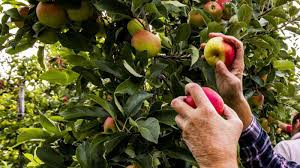Will look into import protection for Kashmir apple growers: Piyush Goyal

🧺 Apple Growers Voice Alarm Over Imports
In a recent visit to Srinagar, Union Commerce and Industry Minister Piyush Goyal met with Kashmiri apple traders and farmers to discuss mounting concerns over foreign apple imports impacting domestic growers. The meeting comes at a time when apple farmers from Jammu & Kashmir, Himachal Pradesh, and Uttarakhand are grappling with falling profits, primarily due to the influx of cheaper apples from countries like Turkey, Iran, and the United States.
During the interaction, Goyal assured the growers that their demands regarding import protection would be taken seriously and discussed with the Ministry of Agriculture. His words have sparked cautious optimism among thousands of families dependent on apple farming in the Kashmir Valley.
🍎 Kashmir’s Apple Industry Under Pressure
Kashmir is home to India’s largest apple-growing region, contributing over 70% of the nation’s apple production. The industry supports millions of livelihoods, from small-scale farmers to traders and transporters. However, in recent years, imported apples have significantly disrupted local markets.
Despite an existing 50% import duty and a Minimum Import Price (MIP) of ₹50/kg, growers claim these measures are no longer effective. International apples, particularly those subsidized by exporting nations, are still undercutting Indian apples in terms of pricing and volume.
A farmer from Sopore, once considered the apple capital of India, shared:
“Imported apples are flooding mandis and driving down the price of our produce. The cost of production in Kashmir is high, and we simply cannot compete unless the government takes stronger steps.”
📉 Imports vs. Local Produce: An Uneven Fight
The disparity in pricing is one of the primary concerns raised by domestic producers. Foreign apples often arrive with higher polish, longer shelf life, and better packaging, making them more appealing to urban consumers. Meanwhile, Indian apples face multiple hurdles—from erratic weather and high transport costs to inadequate cold storage.
In response to these pressures, farmer unions and political representatives from Himachal Pradesh and Jammu & Kashmir have called for:
- Increasing MIP to ₹100/kg
- A complete ban on Turkish apple imports
- Stringent quality inspections
- Special subsidies for local transportation and packaging
Earlier this year, Himachal Pradesh Chief Minister Sukhvinder Singh Sukhu also wrote to Prime Minister Narendra Modi requesting a 100% duty on Turkish apples, citing their impact on local growers.
🗣️ Piyush Goyal’s Reassurance
Speaking with traders at the Sher-e-Kashmir International Conference Centre (SKICC) in Srinagar, Goyal acknowledged their hardships and promised immediate consultations with the Ministry of Agriculture. He emphasized the need for “balancing farmer interests with consumer affordability.”
Goyal also stated that while trade policies must align with India’s international obligations, especially World Trade Organization (WTO) rules and free trade agreements, the government remains committed to protecting “the backbone of India’s economy – its farmers.”
🔄 Past Measures and Current Gaps
In 2023, the government introduced the ₹50/kg MIP to prevent underpricing. However, recent trends suggest that importers are still finding loopholes or importing apples via routes where enforcement is weaker.
Growers argue that the MIP is insufficient considering the ₹80–₹100/kg average cost of growing and distributing high-quality Indian apples. A small apple orchardist in Baramulla lamented:
“We are losing the battle before the season begins. We need a level playing field, not empty promises.”
🛡️ The Road Ahead: Possible Policy Interventions
Goyal’s assurance could translate into several actions:
- Revised MIP: Increasing the MIP to reflect true domestic production costs.
- Higher Duties: Imposing seasonal or country-specific tariffs.
- Anti-Dumping Measures: Investigating and penalizing foreign sellers if underpricing is intentional.
- Quality Controls: Enforcing strict phytosanitary standards to reduce low-grade imports.
- Farmer Support Schemes: Offering logistical subsidies and setting up more controlled atmosphere (CA) storage in apple-producing states.
However, these measures must pass legal and diplomatic scrutiny, especially as India strengthens ties with the US and EU through ongoing trade negotiations.
🧭 Balancing Trade with Farmer Welfare
While India cannot isolate itself from global trade commitments, domestic food security and farmer income must remain top priorities. If implemented well, import safeguards can ensure fair competition while preventing excessive inflation for Indian consumers.
Economists point out that India can explore non-tariff barriers like traceability, labeling norms, and safety standards—tools many developed nations use without violating WTO rules.
✅ Conclusion
Piyush Goyal’s recent commitment is more than a political statement—it’s a test of how seriously India treats the concerns of its agricultural community in the face of globalization. For Kashmir’s apple growers, who toil through harsh weather and logistical challenges, even a slight policy shift could bring much-needed relief.
As the harvest season nears, all eyes are now on whether this assurance will evolve into concrete action—or remain yet another unfulfilled promise.






